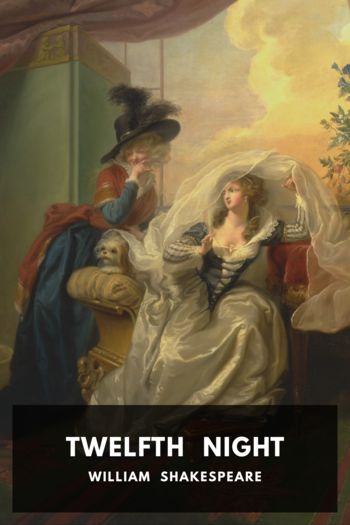Twelfth Night by William Shakespeare (pdf to ebook reader TXT) 📕

Description
A storm has caused a terrible shipwreck off the Illyrian coast. Two siblings, Viola and her brother Sebastian, become separated, each believing the other has drowned. Viola washes ashore and meets a friendly sea captain who offers to help her find work for Duke Orsino—but first she must disguise herself as a man named Cesario.
There is news that Duke Orsino is planning to propose to Countess Olivia. As Viola, disguised as Cesario, meets them both, a love triangle quickly forms. Shakespeare’s ability to weave love, confusion, mistaken identities, and joyful discovery shines through in this timeless romantic comedy.
This Standard Ebooks production is based on William George Clark and William Aldis Wright’s 1887 Victoria edition, which is taken from the Globe edition.
Read free book «Twelfth Night by William Shakespeare (pdf to ebook reader TXT) 📕» - read online or download for free at americanlibrarybooks.com
- Author: William Shakespeare
Read book online «Twelfth Night by William Shakespeare (pdf to ebook reader TXT) 📕». Author - William Shakespeare
The Duke’s palace.
Enter Duke, Viola, Curio, and others. DukeGive me some music. Now, good morrow, friends.
Now, good Cesario, but that piece of song,
That old and antique song we heard last night:
Methought it did relieve my passion much,
More than light airs and recollected terms
Of these most brisk and giddy-paced times:
Come, but one verse.
Seek him out, and play the tune the while. Exit Curio. Music plays.
Come hither, boy: if ever thou shalt love,
In the sweet pangs of it remember me;
For such as I am all true lovers are,
Unstaid and skittish in all motions else,
Save in the constant image of the creature
That is beloved. How dost thou like this tune?
It gives a very echo to the seat
Where Love is throned.
Thou dost speak masterly:
My life upon’t, young though thou art, thine eye
Hath stay’d upon some favour that it loves:
Hath it not, boy?
Too old, by heaven: let still the woman take
An elder than herself: so wears she to him,
So sways she level in her husband’s heart:
For, boy, however we do praise ourselves,
Our fancies are more giddy and unfirm,
More longing, wavering, sooner lost and worn,
Than women’s are.
Then let thy love be younger than thyself,
Or thy affection cannot hold the bent;
For women are as roses, whose fair flower
Being once display’d, doth fall that very hour.
And so they are: alas, that they are so;
To die, even when they to perfection grow!
O, fellow, come, the song we had last night.
Mark it, Cesario, it is old and plain;
The spinsters and the knitters in the sun
And the free maids that weave their thread with bones
Do use to chant it: it is silly sooth,
And dallies with the innocence of love,
Like the old age.
Come away, come away, death,
And in sad cypress let me be laid;
Fly away, fly away, breath;
I am slain by a fair cruel maid.
My shroud of white, stuck all with yew,
O, prepare it!
My part of death, no one so true
Did share it.
Not a flower, not a flower sweet,
On my black coffin let there be strown;
Not a friend, not a friend greet
My poor corpse, where my bones shall be thrown:
A thousand thousand sighs to save,
Lay me, O, where
Sad true lover never find my grave,
To weep there!
Let all the rest give place. Curio and Attendants retire. Once more, Cesario,
Get thee to yond same sovereign cruelty:
Tell her, my love, more noble than the world,
Prizes not quantity of dirty lands;
The parts that fortune hath bestow’d upon her,
Tell her, I hold as giddily as fortune;
But ’tis that miracle and queen of gems
That nature pranks her in attracts my soul.
Sooth, but you must.
Say that some lady, as perhaps there is,
Hath for your love a great a pang of heart
As you have for Olivia: you cannot love her;
You tell her so; must she not then be answer’d?
There is no woman’s sides
Can bide the beating of so strong a passion
As love doth give my heart; no woman’s heart
So big, to hold so much; they lack retention.
Alas, their love may be call’d appetite,
No motion of the liver, but the palate,
That suffer surfeit, cloyment and revolt;
But mine is all as hungry as the sea,
And can digest as much: make no compare
Between that love a woman can bear me
And that I owe Olivia.





Comments (0)